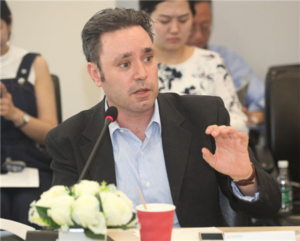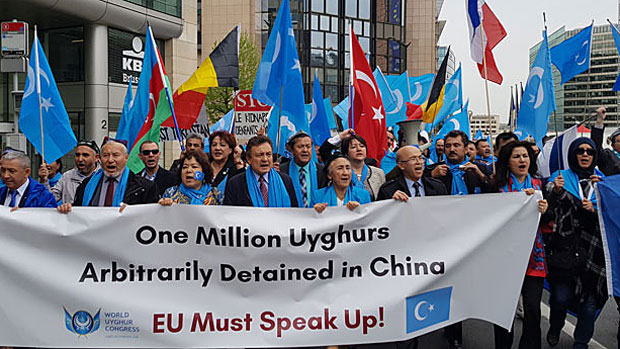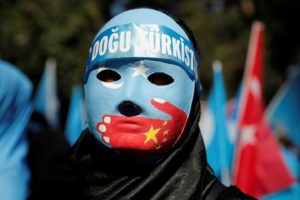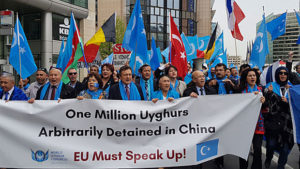Let’s Take Another Look: Are the Xinjiang Internment Camps Legal?
Last week, Sinica interviewed Ambassador Huang Ping, the New York consul general of China. Even though Huang often just speaks the party line, the interview is still very much worth a listen, especially the questions about the Chinese government’s internment of over one million Uyghurs and other Turkic Muslims in Xinjiang without any legal process. (see interview @ 50:54).
Ambassador Huang didn’t deny the existence of these camps, which he euphemistically referred to as “vocational and education training centers.” Instead, he argued, the camps were needed to “deradicalize” the Muslim population and to provide job training. But like the many Chinese government officials before him, Huang provided no proof that these one million Uyghurs demonstrated anything more than the practice of their religion, or why even if they did, the denial of due process is appropriate. And he failed to explain why some Uyghurs with flourishing careers prior to their internment were forced into the camps.
Huang also failed to provide any citation for his statement these camps are “legal” (see interview @ 53:43). But are they? After over four years, now is a good time to look again at why there is still no legal basis under Chinese law for the camps.
Much of what has been happening in Xinjiang is against the backdrop of the 2015 passage of the Counter-Terrorism Law, a vaguely drafted law that often references religion when discussing “extremism.” For violations of the Counter-Terrorism Law that rises to the level of a crime, these matters must be prosecuted through China’s criminal justice system, a.k.a, the court system (see Art. 79). However, there are some situations that do not rise to the level of a crime and instead, the Counter-Terrorism Law allows the police – without accessing the judicial process – to “administratively detain” the person for 10 to 15 days in detention. These minor situations are specifically described in the Law (see Arts. 80-82). Thus, the Counter-Terrorism Law gives only two choices: if you want to deprive someone of their liberty of more than 15 days, you must go through the courts and the criminal process; if you do not want to go through the courts, then the Law only permits up to 15 days of administrative detention and only for the specific behaviors listed in the Law.
Knowing these provisions of the Counter-Terrorism Law are important because under Chinese law, only national level laws can provide for the deprivation of a person’s liberty. Local regulations implementing the national level laws cannot hold a person beyond the time-frame permitted by national law.
But, as China law experts Jeremy Daum and Don Clarke noted back in 2018 (here and here) when it was first coming to light that Uyghurs and other Turkic Muslims were being detained for months to years without any trial or other criminal process, only the Xinjiang local regulations mentioned establishment of “education centers” and suggest that a person’s stay there is lengthy (e.g., individuals will eventually be “returned to society” after their time at the education center). “The [local] regulations provide a legal basis but not a sufficient legal basis,” Daum told me recently when I asked him about the legal basis of the camps. “It doesn’t solve the problem of needing that national level law.” So until there is a change in the Counter-Terrorism Law, these camps are still illegal under Chinese law.
But Daum noted a new argument from the Chinese government: that the camps offer a more lenient diversion from the criminal justice system. This argument first emerged in a series of government white papers from 2019 (and which Huang references in his Sinica interview). And while the white papers are not law, they do offer important policy justifications. “What those white papers are saying is that everybody goes to the camps,” Daum stated. “If we want them to go to the camps, they go to the camps, whether they have been convicted, whether they have been suspected, or whether they could be convicted and were diverted.”
It is this diversion argument – that the camps are a lenient alternative to the criminal justice system – that is becoming more prominent Daum noted. And while Chinese officials may present this as a voluntary choice – that the person choses to go to the camps over running the risk of a harsher prison sentence through the criminal justice system – it isn’t much of a choice when the alternative is a system with a 99.9% conviction rate. Daum also pointed out, this “choice” – camp over prison – is given even to those who committed one of the listed administrative detention offense, which if the Counter-Terrorism Law was followed, would only mean the maximum of 15-day detention. But instead, by offering “diversion,” these individuals end up in a camp with a much longer sentence.
And make no mistake, these camps are not places where people can come and go freely. The leaked “Xinjiang Papers” and “China Cables” make this clear. “The one thing [the papers] really did show was that these schools were managed like a prison. . . .It’s about containing people who don’t want to be contained,” Daum told me.
Ambassador Huang was wrong. These camps are not legal under Chinese law; they weren’t back in 2017 and they still are not today. And even the policy arguments that Chinese officials try to peddle ring hallow. But the one thing to note is that international pressure is doing something; the Chinese government feels that it has to respond to these allegations, even if their response is pathetic. This doesn’t provide solace to the millions of Uyghurs and other Turkic Muslims whose rights, freedom and dignity are constantly violated by the Chinese government, but it shows that the rest of the world must continue its pressure and hold the Chinese government accountable not just to international law but also to its own.
 On Facebook
On Facebook By Email
By Email 





